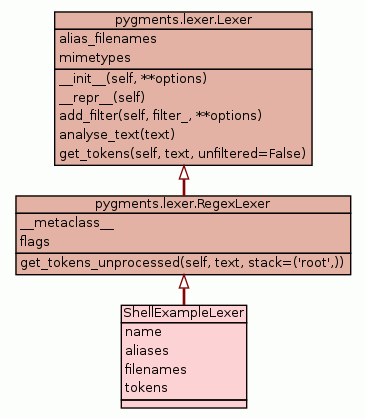tokens
Dict of ``{'state': [(regex, tokentype, new_state), ...], ...}``
The initial state is 'root'. ``new_state`` can be omitted to signify
no state transition. If it is a string, the state is pushed on the stack
and changed. If it is a tuple of strings, all states are pushed on the
stack and the current state will be the topmost. It can also be
``combined('state1', 'state2', ...)`` to signify a new, anonymous state
combined from the rules of two or more existing ones. Furthermore, it can
be '#pop' to signify going back one step in the state stack, or '#push'
to push the current state on the stack again.
The tuple can also be replaced with ``include('state')``, in which
case the rules from the state named by the string are included in the
current one.
- Value:
{"root": [include("comments"), include("userinput"), (r"^\$ ", Text, " input"), (r"\s+", Text), (r"[^#%\s\\]+", Text), (r"\\", Text),], "inpu
input"), (r"\s+", Text), (r"[^#%\s\\]+", Text), (r"\\", Text),], "inpu t": [include("comments"), include("userinput"), (r"[^#%\s\\]+", Generi
t": [include("comments"), include("userinput"), (r"[^#%\s\\]+", Generi c.Strong), (r"\\\n", Generic.Strong), (r"\\", Generic.Strong), (r"\n",
c.Strong), (r"\\\n", Generic.Strong), (r"\\", Generic.Strong), (r"\n", Text, "#pop"), (r"\s+", Text),], "comments": [(r"#.*\n", Comment.Sing
Text, "#pop"), (r"\s+", Text),], "comments": [(r"#.*\n", Comment.Sing le),], "userinput": [(r"(\\)(%)", bygroups(None, Text)), (r"(%)([^%]*)
le),], "userinput": [(r"(\\)(%)", bygroups(None, Text)), (r"(%)([^%]*) (%)", bygroups(None, Name.Variable, None)),],}
(%)", bygroups(None, Name.Variable, None)),],}
|
|

